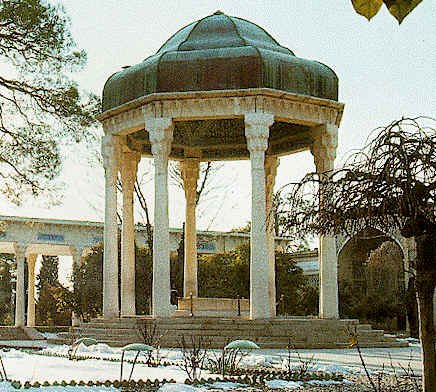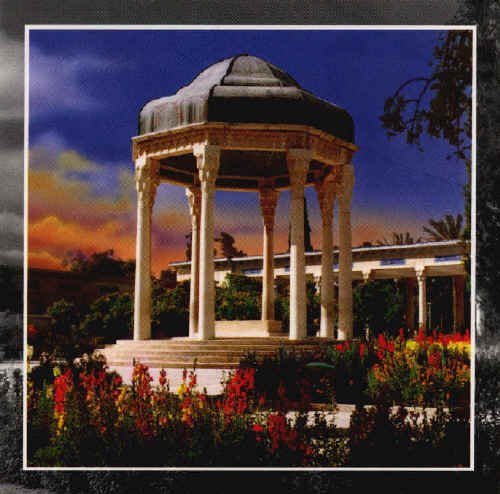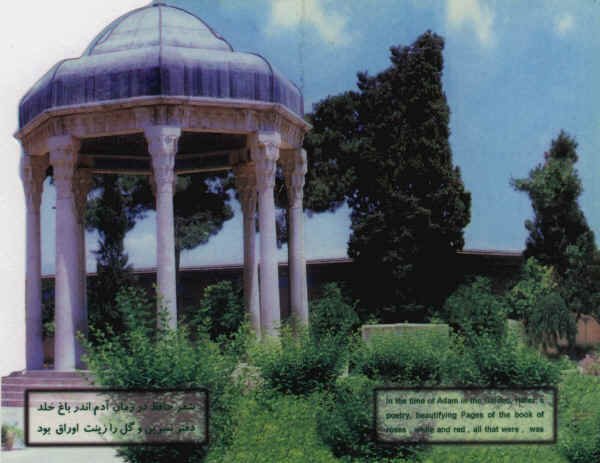Hafez Biography-بیوگرافی حافظ

Very little credible information is know about Hafiz's life, particularly its early part. Immediately after his death, many stories, some of mythical proportions were woven around his life. The following is an attempt at encapsulating what we know with a fair amount of certainty about Hafiz's life.
Birth
Date:
Sometime between the years 1310-1325 a.d. or 712-727 A.H. The most probable date is either 1320, or 1325 a.d.
Place:
Shiraz, in South-central Iran
Name
Shamseddin Mohammad
Family
Pen-Name
Hafiz or Hafez (a title given to those who had memorized the Koran by heart. It is claimed that Hafiz had done this in fourteen different ways).
Full Title
Khajeh Shamseddin Mohammad Hafiz-s Shirazi
Other variations of spelling are:
Khwajeh Shams al-Din Muhammad Hafez-e Shirazi,
or Khwaje Shams ud-Din Mohammed Hafiz-e Shirazi
Father:
Baha-ud-Din
Brothers:
He had two older brothers
Wife:
Hafiz married in his twenties, even though he continued his love for Shakh-e Nabat, as the manifest symbol of her Creator's beauty.
Children:
Hafiz had one child.
Important Events
Teens
He had memorized the Koran by listening to his father's recitations of it. He also had memorized many of the works of his hero, Saadi, as wells as Attar, Rumi and Nizami.
Teens
His father who was a coal merchant died, leaving him and his mother with much debt. Hafiz and his mother went to live with his uncle (also called Saadi). He left day school to work in a drapery shop and later in a bakery.
Age 21
(1341 ad)
While still working at the bakery, Hafiz delivered bread to a wealthy quarter of town and saw Shakh-e Nabat, a young woman of incredible beauty. Many of his poems are addressed to Shakh-e Nabat.
Age 21
In pursuit of reaching his beloved, Hafiz kept a forty day and night vigil at the tomb of Baba Kuhi. After successfully attaining this, he met Attar and became his disciple.
Early twenties to early thirties
Became a poet of the court of Abu Ishak. Gained much fame and influence in Shiraz. This was the phase of "Spiritual Romanticism" in his poetry.
Age 33
Mubariz Muzaffar captured Shiraz, and among his various deeds, he ousted Hafiz from his position of teacher of Koranic studies at the college. At this time he wrote protest poems.
Age 38
Shah Shuja took his tyrant father as prisoner, and re-instated Hafiz as a teacher at the college. He began his phase of subtle spirituality in his poetry.
Early forties
Falling out of favor with Shah Shuja.
Age 48
Hafiz fled Shiraz for his safety, and went into self-imposed exile in Isfahan. His poems mainly talk of his longing for Shiraz, for Shakh-e Nabat, and for his spiritual Master, Attar (not the famous Farid-uddin Attar of Neishabour - who predates Hafiz by a couple of centuries - but the lesser known Attar of Shiraz).
Age 52
By invitation of Shah Shuja, he ended his exile and returned to Shiraz. He was re-instated to his post at the College.
Age 60
Longing to be united with his Creator, he began a forty day and night vigil by sitting in a circle that he had drawn himself.
Age 60
On the morn of the fortieth day of his vigil, which was also on the fortieth anniversary of meeting his Master Attar, he went to his Master, and upon drinking a cup of wine that Attar gave him, he attained Cosmic Consciousness or God-Realization.
Sixties
In this phase, up to the age of 69 when he died, he composed more than half of his ghazals., and continued to teach his small circle of disciples. His poetry at this time, talk with the authority of a Master who is united with God.
Poetry
Divan-e-Hafiz
Some 500 ghazals, 42 Rubaiyees, and a few Ghaseedeh's, composed over a period of 50 years. Hafiz only composed when he was divinely inspired, and therefore he averaged only about 10 Ghazals per year. His focus was to write poetry worthy of the Beloved.
Compiler of Divan
Hafiz did not compile his poetry. Mohammad Golandaam, who also wrote a preface to his compilation, completed it in 813 A.H or 1410 a.d, some 21-22 years after Hafiz's death.Also another person who compiled Hafiz's poetry was one of his young disciples Sayyid Kasim-e Anvar, who collected 569 Ghazals attributed to Hafiz. He died in 1431 a.d. some 42-43 years after Hafiz's death.
Death
Date:
Late 1388 or early 1389 a.d. or 791 A.H. at the age of 69.
Place:
Shiraz
Tomb:
in Musalla Gardens, along the banks of Ruknabad river in Shiraz, which is referred to as Hafezieh.

Controversy:
The orthodox clergy who always opposed Hafiz, refused to allow him to have a Muslim burial. Yet his grass-roots support among the people of Shiraz created an atmosphere of conflict.
The Oracle:
To resolve the controversy, they decided to use Hafiz's poetry, by dividing his ghazals into couplets, and asking a young boy to draw a couplet. It was agreed that however the couplet directed them, they would all consent to follow. The couplet that was chosen was verse 7 of Ghazal #79, which was a tongue-in-cheek response from Hafiz to the orthodox clergy. It reads: Neither Hafiz’s corpse, nor his life negate,
With all his misdeeds, heavens for him wait.
قدم دریغ مدار از جـنازه حافـظ
که گر چه غرق گناه است میرود به بهشت
To this day, Hafiz's Divan (Poetry) is utilized as an Oracle to give guidance to our questions, and direction to realize our wishes.

After His Death
What others say about Hafiz:
Goethe: In his poetry Hafiz has inscribed undeniable truth indelibly ... Hafiz has no peer!
Emerson: Hafiz defies you to show him or put him in a condition inopportune or ignoble ... He fears nothing. He sees too far; he sees throughout; such is the only man I wish to see or be.
Sir Arthur Conan Doyle: ...You may remember the old Persian saying, 'There is danger for him who taketh the tiger cub, and danger also for whosoever snatches a delusion from a woman.' There is as much sense in Hafiz as in Horace, and as much knowledge of the world.
Edward Fitzgerald: The best musician of Words.
Gertrude Bell: It is as if his mental eye; endowed with wonderful acuteness of vision, had penetrated into those provinces of thought which we of a later age were destined to inhabit.
A. J. Arberry: ... Hafiz is as highly esteemed by his countrymen as Shakespeare by us, and deserves as serious consideration.


